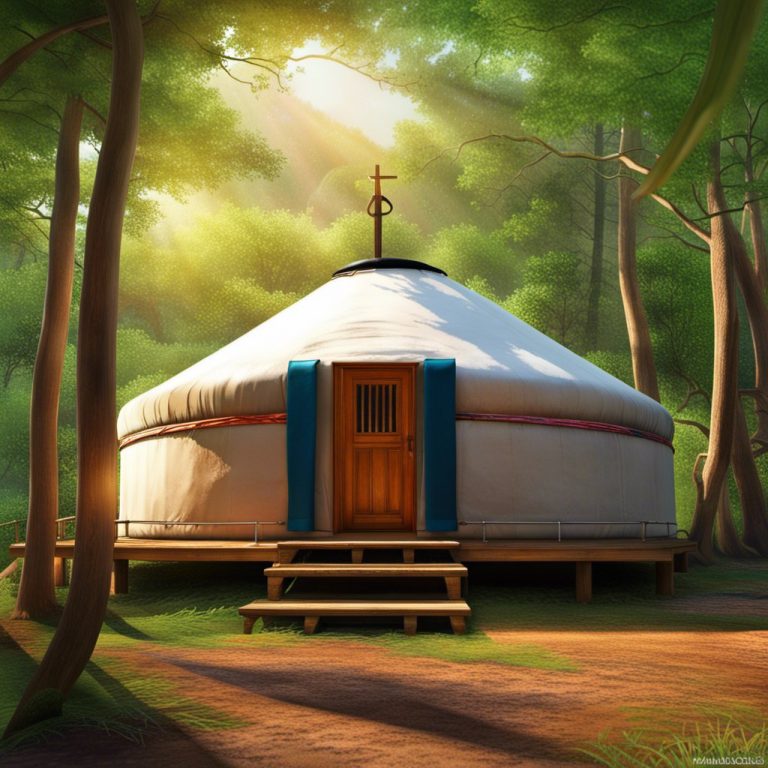Can You Live in a Yurt in Portugal? Pros and Cons to Consider
Living in a yurt is a unique experience that offers a chance to live in a simpler, more sustainable way. Yurts are portable, round tents that are traditionally used by nomadic people in Central Asia. Over the years, yurts have become increasingly popular in other parts of the world, including Portugal.

Portugal is a country with a diverse landscape, from the beaches of the Algarve to the mountains of the Serra da Estrela. It is also a country that has a relatively mild climate, with warm summers and mild winters. This makes it an ideal place to live in a yurt, as they are well-suited to mild, temperate climates.
However, living in a yurt in Portugal is not as simple as just setting up camp. There are a number of legal and practical considerations to take into account. For example, it is important to find a suitable location for your yurt, as well as to ensure that you have the necessary permits and permissions to live there. It is also important to ensure that your yurt is properly insulated and ventilated, as this will help to keep you warm in the winter and cool in the summer.
Living in a Yurt in Portugal

Yurts have become increasingly popular as a housing option in recent years, and Portugal is no exception. Living in a yurt in Portugal can be a unique and sustainable way of life, but it’s important to consider several factors before making the decision to move into one.
Legal Considerations and Location
Before setting up a yurt, it’s essential to check the legal requirements and regulations in the area. In Portugal, there are specific zoning laws that must be followed when building a structure, including a yurt. It’s important to obtain the necessary permits and approvals before starting any construction.
When selecting a location for a yurt, it’s essential to consider factors such as accessibility, proximity to amenities, and environmental impact. Many yurt dwellers in Portugal choose to live in rural areas, where they can enjoy the natural beauty of the country while still having access to necessary utilities and amenities.
Climate Adaptability and Insulation
Portugal’s climate can be quite diverse, depending on the region. Yurts are known for their adaptability to different climates, but it’s important to ensure that the yurt is properly insulated to withstand the weather conditions.
A modern yurt typically includes insulation layers, waterproofing, and a wood stove for heating. Ventilation is also crucial to regulate the temperature and prevent condensation.
Yurt Construction and Materials
Yurts are typically constructed with a wooden frame and covered with canvas or other durable materials. The foundation can be either a platform or a more traditional method, such as a raised platform.
When selecting a yurt, it’s important to consider the quality of the materials and construction. A well-built yurt can last for many years, while a poorly constructed one may require frequent repairs and maintenance.
Sustainability and Eco-Friendly Features
Yurts are often considered a sustainable and eco-friendly housing option. They require fewer resources to construct and maintain than traditional homes, and they can be designed to be energy-efficient.
Many yurt dwellers in Portugal incorporate eco-friendly features such as composting toilets, solar panels, and rainwater harvesting systems into their homes.
Utilities and Amenities
While yurts may be a more minimalist way of living, they still require certain utilities and amenities. Access to clean water, electricity, and waste disposal is essential for comfortable living.
Many yurt dwellers in Portugal use off-grid solutions for utilities, such as solar panels and composting toilets. It’s essential to consider these factors when selecting a location and planning the construction of a yurt.
Living in a yurt in Portugal can be a unique and sustainable way of life. However, it’s important to consider the legal requirements, climate adaptability, construction, sustainability, and necessary utilities and amenities before making the decision to move into one.
Maintenance and Lifestyle

Living in a yurt in Portugal requires regular maintenance and upkeep to ensure that the structure remains in good condition. This section will cover the daily upkeep and repairs, living off the grid, and the cultural significance and modern adaptations of living in a yurt.
Daily Upkeep and Repairs
Maintaining a yurt is relatively easy and simple. Regular cleaning is essential for removing dirt and debris that can cause damage to the yurt. Proper ventilation is also crucial for maintaining the health of a yurt. This can be achieved by leaving windows and doors open during the day and closing them at night to retain heat. In addition, it is important to check the yurt’s ropes and tension bands regularly to ensure that they are secure and tight.
Yurts are durable structures that can last for many years with proper care and maintenance. However, repairs may be necessary from time to time. For example, if a hole appears in the yurt’s cover, it can be patched with a piece of canvas or other durable fabric. If the yurt’s frame becomes damaged, it can be repaired or replaced as needed.
Living Off the Grid
Living in a yurt in Portugal can be a sustainable lifestyle choice. Yurts are environmentally friendly structures that can be powered by alternative energy sources such as solar panels or wind turbines. Living off the grid in a yurt can provide a serene simplicity that is difficult to find in modern society.
Cultural Significance and Modern Adaptations
Yurts have a rich cultural history that dates back to central Asia and Mongolia. Nomads in these regions have been using yurts, also known as gers, as their primary dwelling for centuries. In recent years, yurts have become increasingly popular in Western countries as a unique and affordable housing option.
Modern adaptations of the traditional yurt design include the use of modern materials such as insulated walls and double-glazed windows. These adaptations make yurts more comfortable and practical for year-round living. Living in a yurt in Portugal can provide a unique and fulfilling nomadic lifestyle that is both culturally significant and modern.
Frequently Asked Questions

What are the legal requirements for erecting a yurt in Portugal?
There are no specific legal requirements for erecting a yurt in Portugal, but it is important to check with the local authorities before setting up your yurt. In general, it is necessary to obtain a building permit for any structure that is intended for permanent living. Additionally, you should ensure that your yurt meets the necessary safety standards and is properly anchored to the ground.
Is it possible to reside permanently off-grid in a yurt in Portugal?
Yes, it is possible to reside permanently off-grid in a yurt in Portugal. However, it is important to note that this lifestyle requires careful planning and preparation. You will need to ensure that your yurt is equipped with the necessary utilities such as electricity, water, and waste management systems. Additionally, you will need to be self-sufficient in terms of food and other supplies.
What is the estimated cost for constructing a yurt as a permanent dwelling in Portugal?
The cost of constructing a yurt as a permanent dwelling in Portugal can vary depending on the size, materials, and level of customization. Generally, a basic yurt can cost anywhere from €5,000 to €15,000, while a more luxurious yurt can cost upwards of €30,000. It is important to factor in additional costs such as land acquisition, permits, and utilities.
Are there specific areas in Portugal where yurt living is more feasible?
Yurt living is feasible in most areas of Portugal, but there are some regions that are more suitable than others. Coastal areas tend to have milder temperatures and more moderate weather conditions, while mountainous regions can be colder and more challenging to live in. Additionally, it is important to consider factors such as access to utilities, proximity to services, and availability of land.
What utilities and amenities can one access while living in a yurt in Portugal?
While living in a yurt in Portugal, it is possible to access a variety of utilities and amenities. Electricity and water can be obtained through solar panels, generators, and rainwater collection systems. Additionally, it is possible to install a septic tank for waste management and composting toilets for sanitation. Internet and phone services are also available in most areas.
How does one address sanitation and waste management when living in a yurt in Portugal?
Sanitation and waste management can be addressed through a variety of methods when living in a yurt in Portugal. Composting toilets are a popular option for managing human waste, while greywater can be filtered and reused for irrigation. Additionally, it is possible to install a septic tank for solid waste disposal. It is important to follow local regulations and guidelines for waste management to ensure environmental sustainability.








